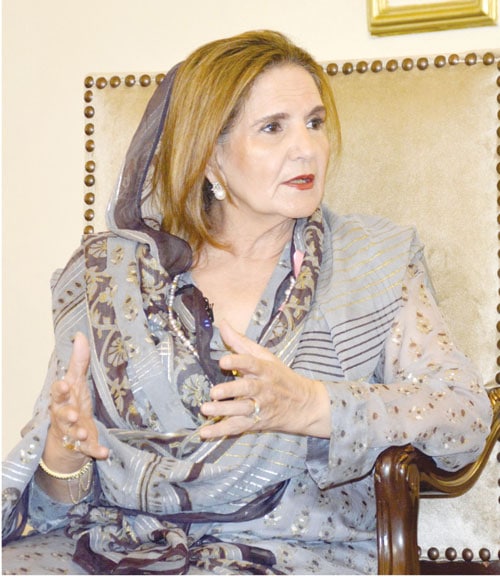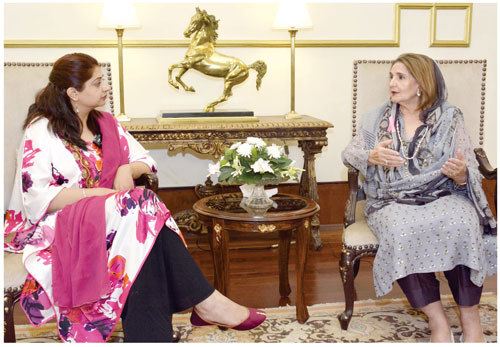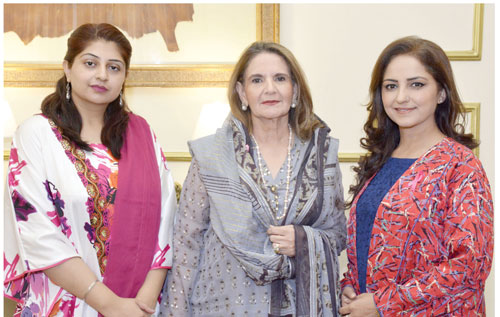In a global effort to raise awareness on breast cancer, October is designated as the Pink Month. A month where efforts are put forth to educate about the disease, including ways of identifying symptoms and risks associated with it.
And for a country like Pakistan which is still stigmatized with the use of the word ‘breast’, it requires far more commitment to overcome the taboo association and create awareness on the seriousness of this condition, specifically in the rural areas.
But when we have someone as resilient and passionate as the First Lady of Pakistan- Begum Samina Arif Alvi, who has pledged to eradicate the taboo factor which acts as a barrier to talk about breast cancer, we know there is hope and progress towards saving lives.

In an exclusive conversation with Pakistan Observer and Social Diary Magazine , the First Lady affirmed that women need to practice the 5-minute self examination every month so any irregularities can be identified during stage 1 as the recovery rate is 98-99% with less trauma. However if a diagnosis is in later stages, there is a 45-48% death rate.
It is important to know 1 in every 9 women in Pakistan will be diagnosed with breast cancer.
The First Lady shared how fear of embarrassment is what is holding our society back in making progress. That is what we need to focus upon and eradicate completely.

It can only happen when we have confident women who are willing to step up and speak of their condition. In a male dominant society, we need a strong support culture where family members, specifically the men, are providing a safe space for the women in their lives to share and speak with ease. The female gender makes up for half of our population and is a major asset to all family members who need to be kept safe at all costs. Excerpts from our interview:
Were you always keen on creating breast cancer awareness or did it take the limelight when you attained the title of the First Lady?
First Lady: I only came to know the urgency with which this disease needs to be talked of when I became the First Lady. Before shining the light on women’s progress and empowerment, we need to emphasize the need to save their lives.
How has the awareness level progressed through the years?
First Lady: When I started off, I was amazed to know that even members of our well-educated society do not adapt to self-examination. So there was major work to be done. We have participated in multiple chamber of commerce events, meeting up with business women and encouraging open discussion on this disease, highlighting how not adapting timely monitoring will lead to serious consequences and can prove to be fatal. The good thing is that there has been a progressive shift as according to Shaukat Khanum Cancer Hospital, a significant rise of patients coming for treatment in the first stage of diagnosis has been noted.
Are there free screening facilities and discounted treatment options for the low-income group?
First Lady: Our aim besides imparting awareness is to provide complete information on readily available screening and treatment options. At the moment, there are many institutions in Sindh, particularly 13 in Karachi, 8 in Punjab, 3 in Islamabad, 5 in KPK, and 3 hospitals in Balochistan which are providing free mammography facilities to the public. Other than that, there are 10 hospitals in Karachi which are providing discounted rates for breast cancer testing facilities. Through the media, I would like to reach out to the public on how they should be utilizing these facilities..
Among the various districts and provinces you have covered-which area did you feel had the least awareness level on the seriousness of this condition?
First Lady: While there is an existing level of awareness in major cities like Islamabad, Karachi and Lahore however for smaller regions and rural districts, major efforts and careful work needs to be done. Like how last year, we went to Khyber Medical College and made major announcements through newspapers that we are giving free facilities for one month in October, which got an effective response. We are emphasizing and setting the spotlight on the 5-minute self-examination. Our teams are focusing on communicating how we may not be able to eradicate the disease but we can halt its spread.
Aside from media, do you feel we need to utilize and make use of other platforms too so as to increase the awareness level, involving educational institutions like colleges and universities? Should they be actively running campaigns more often?
First Lady: That is being done already in major ways. We have been visiting O-level and A-level students; basically falling in the age group of 14-16 years, conducting several awareness campaigns and workshops.
But when it comes to raising awareness in men-why are there still major limitations to how much can be done?
First Lady: It is a major thought process which needs uplifting. Having said that, there is still so much being done as now we are actually involving men more actively. It is important to mention men can be diagnosed with this disease too, however it is rare and there is a diagnosis rate of 1-2%. However, for the opposite gender, we have seen cases of girls aged 12 years and 18years who were diagnosed with breast cancer, which is why it is important that female awareness is pursued more strongly.
Your vision on creating major support groups. How important are they to make communication readily accessible?
First Lady: Support groups are most definitely needed. Through our organized panel discussions, we try to bring forth survivors who share their stories to bring in the motivational boost on how you can fight this disease and still lead healthy lives.
Do genes and heredity lead to higher risks of breast cancer diagnosis?
First Lady: If you have inherited a mutated copy of either gene from a parent, you have a higher risk of breast cancer. This risk is also affected by how many other family members have had breast cancer.
Are there any preventive tactics to adapt?
First Lady: Some risk factors, such as family history, can’t be changed. However, there are lifestyle changes, like eating healthy and working out, which can help you to lower your risk.
How can we adapt the dynamics of telemedicine to allow women more freedom to communicate and get information without the need to step out of their houses?
First Lady: We are definitely trying to bring forth such initiatives. For instance we are working on an app which will provide complete intel on breast cancer services including information on hospitals, where to get mammograms, online counseling etc.
As a media house, what more can we do to support your cause?
First Lady: Firstly I would like to extend my thanks to the media for their consistent support as well as the work efforts of NGOs and even girl guides in raising awareness on grass root levels. The upward curve has been showing our steady progress to attain the awareness level we seek. However, to ensure all family members, specifically the men, are watching such infotainment programmes on breast cancer, the programmes should be broadcasted at prime time rather than just morning hours when everyone is busy and occupied. When we know everyone is watching, everyone is seeking information, the quest to protect ourselves and loved ones becomes attainable.










